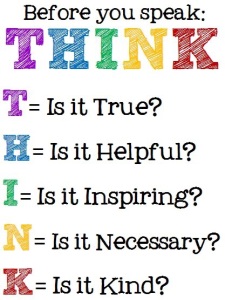
Gracious words are a honeycomb, sweet to the soul and healing to the bones ~ Proverbs 16:24
Do you remember all the situations where you said something you regretted deeply? All the times where you wished to have thought a little bit better before speaking and avoided the embarrassment you faced. I can surely make a long list for the same and I’m sure you have plenty of those just like me, right? To think before you speak is a much-needed skill and today in this blog, we’ll talk about just that along with tips on how to think before you speak.
Read on because, by the end of this blog, you’ll know all my top tips and tricks on how to think before you speak and not put your foot in your mouth!
How difficult can it be to think before you speak?
Thinking before speaking isn’t rare; it’s almost human nature to feel the need to contribute to a conversation. Sometimes, you may feel emotional about a topic and may not think before you talk about it. Hence, it can be pretty hard to stop yourself from blurting out the first thing that pops into your head. There are a variety of reasons that can prevent you from thinking before speaking. So, don’t beat yourself about it if it happens to you.
That being said, you do need to remember that we as humans are social beings and need to communicate effectively in our everyday lives. Communication is the key to happy and sorted relationships. Hence, it’s important to inculcate the habit of being able to think before you speak with anyone.
Why should you think before you speak?
A colleague once asked me why I should think before speaking? How does it even matter!
Thinking before speaking is pretty much a life skill. Here are some basic reasons for you to think before you speak:
- It’s essential for your credibility because if what you communicate isn’t credible or useful, people won’t respect you or your words. Imagine that you are in a group discussion around international relations and you mistakenly mention that the capital of Japan is Beijing in a hurry. If it wasn’t because you didn’t know that Japan’s capital is Tokyo but because you didn’t take the time to process or think before you speak. Such an incident will reduce your credibility but could’ve been easily avoided if you had taken a pause to think.
- Another reason for you to think before you speak is that if you do not think before you speak, you might end up hurting someone. Sometimes when we get emotional, it’s easy to get carried away and react to everything negatively. This is pretty common when we are arguing with our loved ones and hence, can impact our relationships severely. Hence, the ability to think before you speak can be fruitful in such scenarios.
- Thinking before speaking can also help you stay out of trouble in several ways.Let’s say you’re in a meeting and your boss asks for a volunteer to take over the operations for your company’s newly acquired venture in Yemen. You say yes, just to please your boss without understanding the whole deal and now, you don’t know how to refuse. Had you listened and thought before speaking, you’d save yourself from the trouble of explaining yourself.
I hope you got enough reasons to think before you speak now? Great. Now, let’s move on to our next pertinent question.
- It’s essential for your credibility because if what you communicate isn’t credible or useful, people won’t respect you or your words. Imagine that you are in a group discussion around international relations and you mistakenly mention that the capital of Japan is Beijing in a hurry. If it wasn’t because you didn’t know that Japan’s capital is Tokyo but because you didn’t take the time to process or think before you speak. Such an incident will reduce your credibility but could’ve been easily avoided if you had taken a pause to think.
- Another reason for you to think before you speak is that if you do not think before you speak, you might end up hurting someone. Sometimes when we get emotional, it’s easy to get carried away and react to everything negatively. This is pretty common when we are arguing with our loved ones and hence, can impact our relationships severely. Hence, the ability to think before you speak can be fruitful in such scenarios.
- Thinking before speaking can also help you stay out of trouble in several ways. Let’s say you’re in a meeting and your boss asks for a volunteer to take over the operations for your company’s newly acquired venture in Yemen. You say yes, just to please your boss without understanding the whole deal and now, you don’t know how to refuse. Had you listened and thought before speaking, you’d save yourself from the trouble of explaining yourself.
I hope you got enough reasons to think before you speak now? Great. Now, let’s move on to our next pertinent question.
Why does it happen? Why is it so hard to think before you speak?
The answer to this often has to do with impulse control or to be precise, the lack of it. Impulse control is simply the ability to control an urge to do something or control a reaction to anything. So, it’s possible that you can not think before you speak due to impulse control issues.
I’m sure you’ve asked yourself, “Why can’t I think clearly when talking to people?” or “Why do I always end up saying the wrong things?” Trust me, because I have too. There are many reasons for this but in general, you don’t think before you speak: a lack of patience, the lack of listening skills, or due to impulsiveness.
The Lack of Patience
Talking about the lack of patience, it’s pretty self-explanatory. Our urge to contribute to a conversation or the urge to be an active part of a discussion can sometimes be problematic. The lack of patience in such scenarios can lead to you interrupting others before they’re done and saying something incorrectly. It’s not easy to be patient and take a pause especially while talking about something we’re passionate about and thus, can lead to speaking before thinking.
The Lack of Listening Skills
Listening skills are as important for effective communication, if not more, than speaking skills. It’s nearly impossible to add something of value to a discussion or carry a conversation forward without listening actively. A lack of listening skills can even negatively impact your relationships as you might end up saying something you don’t mean. Hence, listening is essential to think before you speak.
Being Impulsive
Being impulsive is another trait that can be the reason behind your inability to think before you speak. Impulsiveness (or impulsivity) is the tendency to act on a whim, displaying behavior characterized by little or no forethought, reflection, or consideration of the consequences. So, being impulsive can lead to you not thinking before speaking too.
You know enough about why you can’t think before you speak normally now, right?
But should you always think before speaking?
I’d say you should mostly think before you speak, it’ll save you a lot of trouble, the Lord gave us two ears and one mouth, to talk less and listen more. But if you’re just hanging out with friends and not really discussing anything specific, it’s okay to just go with the flow as well. Overthinking everything just like underthinking can be problematic.
So, yes always try to think enough before you speak but don’t venture into the territory of overthinking.
Now that we’ve covered a bunch of questions about why we can’t think before speaking and why we should, let’s get into the ways to achieve it. I’m going to tell you actionable ways on how to think before you speak.
The THINK Acronym
- The ultimate think before you speak trick is the word THINK itself, an acronym.
Before speaking anything, just THINK; this is to ask yourself five questions: Is what I’m saying True, is it Helpful, is it Inspiring, is it Necessary, and is it Kind enough?
- T For True: Always make sure whatever you are saying is true. Don’t try to make something up or add fuel to gossip just to have something to say. Just be honest and your words will immediately be more impactful.
- H For Helpful: Helpful words are usually appreciated by everyone. So, if you have something to say that can be of help to someone, go ahead. But if you think that your words might be hurtful or mocking, then avoid speaking.
- I For Inspiring: Saying something that’s encouraging, motivational, or inspiring is always a good idea. It can be anything from giving someone a small compliment on someone’s presentation to inspiring others to achieve their goals with your story.
- N For Necessary: Speak when necessary or try not to speak. Often we need to warn people before they do something they shouldn’t or even explain a necessary concept to someone.
- K For Kind: If you don’t have something positive and kind today, don’t say it. Humans are emotional beings and need reassurance from time to time. So, try not to be harsh with your words and don’t hurt others. It’s important to speak considerably and kind to everyone.
This is the golden rule on thinking before you speak, once you ask yourself these questions and get yes as the answer. You’re good to go! Because if what you speak passes this method with flying colors, it’s undoubtedly worthy of being said. Also, you can even put up a THINK before you speak poster in your room if you’d like to remember this method.

Wait, that’s not all; we’ve got more tips to assist you.
The Power of Mental Pause
- Next up, utilize the power of your mental pause. In the words of a wise man, “Better than a thousand hollow words is one word that brings peace.”
Simply put, take a breather and compose your thoughts before jumping on the speaking train. Hasty words can trouble you for a long time, even after they have left your mouth. So, learn to press the pause button. Imagine it as a pause button that you use to rewind your thoughts, think of the right response, and finally, press play.
We all have a mental pause button that we can learn to use over time. It’s the time we take to respond and it’s absolutely normal. So, make it a habit to utilize your mental pause button to master how to think before you speak.
If you find the silence disturbing, just say, “I need a minute to ponder over this, thank you” before speaking. It’s always better to take some time to think before you speak. The pause helps you respond instead of reacting. You can also say, “I don’t think I know enough on this topic,” instead of forcing yourself to speak without knowledge.
- Now on to the third tip, listen and listen carefully. A significant part of effective and thoughtful communication is listening. If you listen to others intently, you’ll be able to converse better and also partake in conversations without saying something awkward.
To give you an example, once at a social gathering, I was talking to a bunch of vegans. One of them probably mentioned that they do not think it’s okay to eat animal products, but I was busy using my phone and misunderstood because I didn’t listen properly and blurted out “Of course, non-vegetarian food is great.” And went on to talk about non-vegetarian food. I didn’t realize right away but it got awkward pretty quickly. So, it’s better to just listen and avoid such a blunder. Make sure you listen with your ears open if you’d like to think before you speak.
How to get into the habit of thinking before I speak?
One way of honing this habit is to have practice conversations with friends or peers about some impromptu topics. This will challenge you to think on the spot and you can then think before you give each response. First, start by taking as much time as you need and measure each response time. After a while, you can start running an actual or mental timer of a few seconds to think of a proper response before the time runs out. This will not only help you practice how to think before you speak but will also help you hone the skill of quick thinking on the spot. Such skills are very helpful in personal and professional situations in which you are required to think on the spot and showcase your intelligence or responsiveness. There are other ways to become a better quick thinker as discussed below.
Becoming A Quick Thinker
The sure-shot way of mastering thinking before speaking is becoming a quick thinker and improving your responses over time. Becoming a quick thinker makes your impression on people around you better and helps you perform well in unpredictable situations when you are required to speak. Many times you might have come across situations in your personal and professional life where you had to think on your feet but you could not come up with a proper response because you spent too much time thinking before you speak. Here are a few tips on how you can tackle such situations better:
1. Note down some responses you would like to give in these situations in the future.
2. Plan some generic positive remarks, comments, or stories you can use when asked to speak up without notice.
3. Think of some questions you can ask to change the conversation topic or deflect the conversation to another person.
These handy tips can help you go a long way in saving time when thinking before speaking and make you come off as intelligent and quick but still thoughtful.
So, I’m sure you understand how important it is to think before we speak. It’s a life skill that can help us grab opportunities and excel professionally and personally. Refer to the above table to get a quick glance at everything we’ve discussed and worked on your mental pause. I hope that I could help you with some useful tips!
——————-
**By Prageet Goel at Orai / Photo at Pexels











You must be logged in to post a comment.